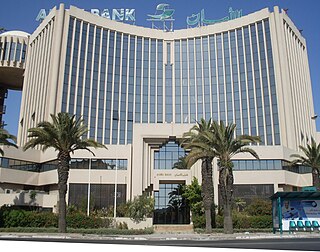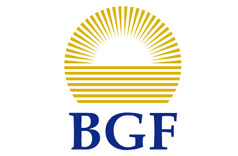
The economy of Pakistan is categorized as a developing economy. It ranks as the 24th-largest based on GDP using purchasing power parity (PPP) and the 46th largest in terms of nominal GDP. With a population of 241.5 million people as of 2023, Pakistan's position at per capita income ranks 161st by GDP (nominal) and 138th by GDP (PPP) according to the International Monetary Fund (IMF).

The economy of Tunisia is in the process of being liberalized after decades of heavy state direction and participation in the country's economy. Prudent economic and fiscal planning has resulted in moderate but sustained growth for over a decade. Tunisia's economic growth historically has depended on oil, phosphates, agri-food products, car parts manufacturing, and tourism. In the World Economic Forum Global Competitiveness Report for 2015–2016, Tunisia ranks in 92nd place.

Development economics is a branch of economics that deals with economic aspects of the development process in low- and middle- income countries. Its focus is not only on methods of promoting economic development, economic growth and structural change but also on improving the potential for the mass of the population, for example, through health, education and workplace conditions, whether through public or private channels.

The Club of Rome is a nonprofit, informal organization of intellectuals and business leaders whose goal is a critical discussion of pressing global issues. The Club of Rome was founded in 1968 at Accademia dei Lincei in Rome, Italy. It consists of one hundred full members selected from current and former heads of state and government, UN administrators, high-level politicians and government officials, diplomats, scientists, economists, and business leaders from around the globe. It stimulated considerable public attention in 1972 with the first report to the Club of Rome, The Limits to Growth. Since 1 July 2008, the organization has been based in Winterthur, Switzerland.

The Brundtland Commission, formerly the World Commission on Environment and Development, was a sub-organization of the United Nations (UN) that aimed to unite countries in pursuit of sustainable development. It was founded in 1983 when Javier Pérez de Cuéllar, the Secretary-General of the United Nations, appointed Gro Harlem Brundtland, former Prime Minister of Norway, as chairperson of the commission. Brundtland was chosen due to her strong background in the sciences and public health.

The economy of India is a developing mixed economy with a notable public sector in strategic sectors. It is the world's fifth-largest economy by nominal GDP and the third-largest by purchasing power parity (PPP); on a per capita income basis, India ranked 141th by GDP (nominal) and 125th by GDP (PPP). From independence in 1947 until 1991, successive governments followed the Soviet model and promoted protectionist economic policies, with extensive Sovietization, state intervention, demand-side economics, natural resources, bureaucrat driven enterprises and economic regulation. This is characterised as dirigism, in the form of the Licence Raj. The end of the Cold War and an acute balance of payments crisis in 1991 led to the adoption of a broad economic liberalisation in India and indicative planning. Since the start of the 21st century, annual average GDP growth has been 6% to 7%. India has about 1,900 public sector companies, with the Indian state having complete control and ownership of railways and highways. The Indian government has major control over banking, insurance, farming, fertilizers & chemicals, airports,, defense, essential utilities, and the energy sector. The state also exerts substantial control over digitalization, Broadband as national infrastructure, telecommunication, supercomputing, space, port and shipping industries, which were effectively nationalised in the mid-1950s but has seen the emergence of key corporate players.

Kenneth Saul Rogoff is an American economist and chess Grandmaster.

The Japanese economic miracle refers to Japan's record period of economic growth between the post-World War II era and the beginning of the global Oil Crisis (1955-1973). During the economic boom, Japan rapidly became the world's third-largest economy, after the United States and the Soviet Union. By the 1970s, Japan was no longer expanding as quickly as it had in the previous decades despite per-worker productivity remaining high.
Economic liberalization, or economic liberalisation, is the lessening of government regulations and restrictions in an economy in exchange for greater participation by private entities. In politics, the doctrine is associated with classical liberalism and neoliberalism. Liberalization in short is "the removal of controls" to encourage economic development.

Business economics is a field in applied economics which uses economic theory and quantitative methods to analyze business enterprises and the factors contributing to the diversity of organizational structures and the relationships of firms with labour, capital and product markets. A professional focus of the journal Business Economics has been expressed as providing "practical information for people who apply economics in their jobs."

The Government Development Bank for Puerto Rico (GDB) —Spanish: Banco Gubernamental de Fomento para Puerto Rico (BGF)— is the government bond issuer, intragovernmental bank, fiscal agent, and financial advisor of the government of Puerto Rico. The bank, along with its subsidiaries and affiliates, serves as the principal entity through which Puerto Rico channels its issuance of bonds. As an overview, the different executive agencies of the government of Puerto Rico and its government-owned corporations either issue bonds with the bank as a proxy, or owe debt to the bank itself.
The economic liberalisation in India refers to the series of policy changes aimed at opening up the country's economy to the world, with the objective of making it more market-oriented and consumption-driven. The goal was to expand the role of private and foreign investment, which was seen as a means of achieving economic growth and development. Although some attempts at liberalisation were made in 1966 and the early 1980s, a more thorough liberalisation was initiated in 1991.
The Brookings Papers on Economic Activity (BPEA) is a journal of macroeconomics published twice a year by the Brookings Institution Press. Each issue of the journal comprises the proceedings of a conference held biannually by the Economic Studies program at the Brookings Institution in Washington D.C. The conference and journal both "emphasize innovative analysis that has an empirical orientation, take real-world institutions seriously, and is relevant to economic policy."

The post–World War II economic expansion, also known as the postwar economic boom or the Golden Age of Capitalism, was a broad period of worldwide economic expansion beginning with the aftermath of World War II and ending with the 1973–1975 recession. The United States, the Soviet Union and Western European and East Asian countries in particular experienced unusually high and sustained growth, together with full employment.

The International Resource Panel is a scientific panel of experts that aims to help nations use natural resources sustainably without compromising economic growth and human needs. It provides independent scientific assessments and expert advice on a variety of areas, including:
Horasis is an independent, international think tank, headquartered in Zurich, Switzerland. Founded in 2005, by Frank-Jürgen Richter, former director of the World Economic Forum, Horasis is committed to fostering innovation and promoting the sustainable development of emerging markets. The annual Horasis Global Meeting in Cascais, Portugal, is a gathering of business people with government officials, scientists and intellectuals centered on issues concerning corporations and societies.
The anthropology of development is a term applied to a body of anthropological work which views development from a critical perspective. The kind of issues addressed, and implications for the approach typically adopted can be gleaned from a list questions posed by Gow (1996). These questions involve anthropologists asking why, if a key development goal is to alleviate poverty, is poverty increasing? Why is there such a gap between plans and outcomes? Why are those working in development so willing to disregard history and the lessons it might offer? Why is development so externally driven rather than having an internal basis? In short, why is there such a lack of planned development?
Infrastructure-based economic development, also called infrastructure-driven development, combines key policy characteristics inherited from the Rooseveltian progressive tradition and neo-Keynesian economics in the United States, France's Gaullist and neo-Colbertist indicative planning, Scandinavian social democracy as well as Singaporean and Chinese state capitalism: it holds that a substantial proportion of a nation’s resources must be systematically directed towards long term assets such as transportation, energy and social infrastructure in the name of long term economic efficiency and social equity.

The Centre for Economic Performance (CEP) is an interdisciplinary research centre at the London School of Economics dedicated to the study of economic growth and effective ways to create a fair, inclusive and sustainable society. Currently led by Prof. Stephen Machin, it is one of the world's most prestigious economic research institutes, being the most important economic research institute in the United Kingdom, jointly with the Centre for Economic Policy Research. Its research performance has been particularly strong in the research areas of labour economics, productivity, happiness economics, human capital, the knowledge economy, ICT, innovation, education, and European microeconomic issues.

Environmental globalization refers to the internationally coordinated practices and regulations regarding environmental protection. An example of environmental globalization would be the series of International Tropical Timber Agreement treaties, establishing International Tropical Timber Organization and promoting sustainable management of tropical forests. Environmental globalization is usually supported by non-governmental organizations and governments of developed countries, but opposed by governments of developing countries which see pro-environmental initiatives as hindering their economic development.












